The Classic Poem You’ll Love, Based On Your Myers-Briggs® Personality Type
I’ve been an avid reader of classic poetry and literature for as long as I can remember. When I’m having a bad day I can nearly always find a poem to inspire me, motivate me, or to simply seek solace in. Poetry can allow us to process our feelings, find hope in the midst of darkness, or find words that describe our grief, happiness, or even anxiety.
In today’s post we’ll be exploring one classic poem that I think will inspire each of the 16 Myers-Briggs® personality types. I hope you enjoy the one I’ve selected for you!

Keep in mind, I’m not suggesting that the poets themselves have the specific personality types, only that the poems they wrote would appeal to those specific personality types.
Want to find out what your personality type is? Take our personality questionnaire here. Or you can take the official MBTI® here.
The Classic Poem You’ll Love, Based On Your Myers-Briggs® Personality Type
The ENFP – Ah, great it is to believe by Edwin Markham
“Ah, great it is to believe the dream
As we stand in youth by the starry stream;
But a greater thing is to fight life through
And say to the end, the dream came true!”
Often called the visionaries or the champions, ENFPs strive to bring their dreams to fruition. Blessed with boundless imaginations, ENFPs want to stretch the boundaries of what’s possible; to innovate, create, and make something meaningful.
Ah, great it is to believe captures the idealistic spirit of the ENFP, as well as their determination to make their dreams come true. Edwin Markham, the author of this poem, was a dreamer as well. As the youngest of 10 children, it would have been easy for him to get lost in the shuffle or disappear. In fact, his mother refused to buy him books to read or to finance his education in any way. But Markham became a voice of progressive social and spiritual beliefs. His most famous poem, “The Man with the Hoe” shone a light on the suffering of oppressed laborers throughout world history. Markham believed in better treatment for the working class and his poem became a catalyst for improvement. His poetry also became an avenue for him to express his ideals; unity of humankind, the power of the imagination, and the belief that the world could be better. In Markham’s words ENFPs will find a kindred spirit and the inspiration to believe in their dreams and go after them!
Read This Next: 10 Must-Read Books for ENFPs
The ENTP – Ulysses by Alfred, Lord Tennyson
“The long day wanes: the slow moon climbs: the deep
Moans round with many voices. Come, my friends,
’Tis not too late to seek a newer world.
Push off, and sitting well in order smite
The sounding furrows; for my purpose holds
To sail beyond the sunset, and the baths
Of all the western stars, until I die …”
ENTPs are often called the trailblazers or the debaters in the type community. Their restless minds beckon them to press against the boundaries of the expected. Tireless in their pursuit of improvement and truth, ENTPs often struggle to keep up with their numerous ideas and innovative pursuits. In Ulysses, Alfred, Lord Tennyson explores the plight of Odysseus and his desire to live life to the fullest. Rather than stay at home by the hearth, he yearns to roam the earth, to explore many different types of people and ways of living. He declares that it’s boring to stay in one place, and that he craves “To follow knowledge like a sinking star, Beyond the utmost bound of human thought.”
Regardless of how old Odysseus grows, he’s determined to never stop striving for more adventure, experience, and understanding. In the poems famous closing lines, he states “We are not now that strength which in old days Moved earth and heaven, that which we are, we are; One equal temper of heroic hearts, Made weak by time and fate, but strong in will To strive, to seek, to find, and not to yield.”
ENTPs will identify with Odysseus’s dream, his passion, and his desire to explore the unknown and challenge himself both physically and mentally. If you’re an ENTP reading this poem, I urge you to explore more of what’s possible and more of what you can accomplish, regardless of age or life circumstances.
Read This Next: 10 Must-Read Books for ENTPs
The INFP – To Imagination, by Emily Bronte
“When weary with the long day’s care,
And earthly change from pain to pain,
And lost, and ready to despair,
Thy kind voice calls me back again,
Oh, my true friend! I am not lone,
While thou canst speak with such a tone!”
Often called the dreamers or the healers, INFPs are known for their profound imagination. In Emily Bronte’s To Imagination, she describes the solace and comfort of her dreams. She explains that she’s not alone because her imagination is, in a sense, her dearest friend. In imagination she sees the power to enlighten everything and make every moment more meaningful.
“So hopeless is the world without,
The world within I doubly prize;
Thy world, where guile, and hate, and doubt,
And cold suspicion never rise;
Where thou, and I, and Liberty,
Have undisputed sovereignty.”
This stanza from Bronte’s poem captures a feeling of inner freedom and hope that can be obtained via the imagination. She compares the world outside, with all its corruptions, to the incomparable purity and beauty of her inner world. In Bronte’s words INFPs will find solidarity and connection because they, too, cherish the inner world of imagination and profound feelings and convictions. They also struggle to make sense of a world that is often so in conflict with their inner values and the ideals they hold dear.
Read This Next: The INFP Learning Style
The INTP – My Mind to Me a Kingdom Is by Sir Edward Dyer
“My mind to me a kingdom is;
Such present joys therein I find,
That it excels all other bliss
That earth affords or grows by kind:
Though much I want that most would have,
Yet still my mind forbids to crave.”
INTPs are known for their inquisitive minds and thirst for knowledge. They often get lost in thought, exploring different theories and ideas with endless curiosity. In My Mind to Me a Kingdom Is, Sir Edward Dyer explores the idea that true happiness comes from within. He explains that even though he doesn’t have all the material possessions that others might have, he’s content because his mind is a rich kingdom in and of itself.
Sir Edward Dyer served Queen Elizabeth I’s court and was later knighted and made Chancellor of the Order of the Garter. While he had a tremendous amount of respect, he wasn’t always happy with the pressures of life at court. William Oldys, a bibliographer, said that Dyer “would not stoop to fawn” and “hated flatterers”. From this, we can see that Dyer was a man who valued his own thoughts and opinions above the approval of others. INTPs will likely relate to the solace and value Dyer places on introspection and the pursuit of knowledge.
Read This Next: The INTP Cognitive Function Stack
The ENFJ – No Man Is an Island by John Donne
“No man is an island,
Entire of itself,
Every man is a piece of the continent,
A part of the main.
If a clod be washed away by the sea,
Europe is the less.
As well as if a promontory were.
As well as if a manor of thy friend’s
Or of thine own were:
Any man’s death diminishes me,
Because I am involved in mankind,
And therefore never send to know for whom the bell tolls;
It tolls for thee.”
ENFJs are unique in that they easily see the interconnectedness of all people. Their business is that of understanding people and bringing them together to make the world a better place. In No Man Is an Island, John Donne explores the idea that we are all connected and that the death of any one person impacts us all. He explains that we should never turn a blind eye to the suffering of others because, in a sense, it is our own suffering as well. Often considered the greatest-loved poet in the English language, John Donne was known for his passion, wit, and dramatic prose describing complex states of mind. He had the ability to turn everyday words and situations into poems rich with meaning and symbolism. ENFJs will appreciate this gift for they, too, are drawn to the symbolic and meaningful.
The ENFJ will be able to relate to this poem on a deep level because they understand the importance of community and togetherness. They also feel a great sense of responsibility for the well-being of others. While other people may see disparate circumstances, ENFJs easily sense how each personal interaction has ripple-effects that touch everyone’s lives.
Read This Next: 10 Must-Read Books for ENFJs
The ENTJ – Brave Hearts by Charles Swain
“Brave hearts bend not so soon to care-
Firm minds uplift the load of fate;
They bear what others shrink to bear,
And boldly any doom await!
They rise above what would oppress
A weaker spirit to the ground;
And, though they feel no jot the less,
Their sorrows scorn to breathe a sound”
Often called “the commanders” or “the strategists,” ENTJs are known for taking on challenges and taking charge of situations. Assertive and driven, they strive to conquer any obstacles that get in the way of their vision. Sometimes this means they over-value action and strategy and undervalue emotion and rest. At the same time, ENTJs are often very compassionate people who care deeply for others, even if they don’t always show it.
In Brave Hearts, Charles Swain explores the idea of emotional fortitude. He explains that brave hearts don’t give in to sorrow or pain, but instead rise above it and carry on. This is something that ENTJs can definitely relate to. They often feel a great sense of responsibility for the people in their lives and want to be strong for them, even when they’re going through tough times themselves. ENTJs may not always show their emotions, but that doesn’t mean they don’t feel them just as deeply as anyone else.
Read This Next: 10 Must-Read Books for ENTJs
The INFJ – The Dreamer by Oscar H. Roesner
“Deny me the vision, I perish;
Rob me of dream and I die;
Life void of vision and dreaming
Is life without sun in the sky.
Oh, blind my rapt eyes in your hatred,
Submerge me with want and cold care,
But so long as you leave me my dreaming
I’ll laugh at the demon despair.”
INFJs are unique in that they have a very rich inner life. They are often highly creative and intuitive people who see the world in a unique way. Symbolism and meaning stand out to them more than concrete facts. Because of this, they can sometimes feel misunderstood or out of place in the world.
In The Dreamer, Oscar H. Roesner explores the idea of the power of dreams. He explains that without dreams, life is empty and cold. Even in the darkest of times, INFJs will always have their dreams to hold on to. This is something that they can relate to on a very deep level. No matter what others may say or do, INFJs know that their inner world is real and valuable. It is a source of strength and hope that they can always rely on. On top of that, the “vision” of the INFJ is often uncannily accurate or revealing. They trust their insights and believe that sometimes the most powerful pieces of life can’t be seen with the naked eye.
Read This Next: What Makes INFJs Dangerous
The INTJ – He Who Has Vision by Folger McKinsey
“He who has the vision sees more than you or I;
He who lives the golden dream lives fourfold thereby;
Time may scoff and worlds may laugh, hosts assail his thought,
But the visionary came ere the builders wrought;
Ere the tower bestrode the dome, ere the dome the arch,
He, the dreamer of the dream, saw the vision march!”
INTJs are often called “the masterminds” or “the architects.” They are known for their quick minds and their ability to see the world in a very unique and strategic way. They often have grand plans and visions for the future, and they are always looking for ways to make them a reality. Other people may be perplexed by the INTJ’s visions. They are often far ahead of their time. As an example, Nikola Tesla, a rumored INTJ, aimed to build a machine that could have provided free energy to the world. But because his ideas were so far ahead of their time, they were met with skepticism and even condescension by many.
In He Who Has Vision, Folger McKinsey explores the idea of the power of visionaries. He explains that those who have a vision for the future often see things that others cannot. INTJs can definitely relate to this. They often have grand plans and visions that others may not understand. But that doesn’t stop them from pursing their goals. They know that their vision is valuable and worth fighting for, no matter how difficult it may be.
Read This Next: The INTJ and the 5 Love Languages
The ESFP – Song of the Open Road by Walt Whitman
“Henceforth I ask not good fortune – I myself am good fortune;
Henceforth I whimper no more, postpone no more, need nothing.
Strong and content, I travel the open road.”
ESFPs are known for their thirst of adventure and spontaneity. They are always on the lookout for new experiences and opportunities that will thrill them or help them understand another part of themselves. In Song of the Open Road, Walt Whitman captures this spirit perfectly. He celebrates the open road and the egalitarian nature of the people he meets on his travels. Whitman sees himself as part of a grand journey, one where he is free to explore and discover. This is something that ESFPs can definitely relate to. They feel a deep connection to the world around them and they want nothing more than to discover it with their own two hands.
Read This Next: What It Means to be an ESFP Personality Type
The ESTP – Courage by Johann Wolfgang von Goethe
“Carelessly over the plain away,
Where by the boldest man no path
Cut before thee thou canst discern,
Make for thyself a path!
Silence, loved one, my heart!
Cracking, let it not break!
Breaking, break not with thee!”
Daring and action-oriented, ESTPs are known for their wit and their ability to think on their feet. They are often drawn to exciting and challenging situations, loving the adrenaline rush that comes from them. In Courage, Johann Wolfgang von Goethe captures this spirit perfectly. He encourages others to take risks and to forge their own path in life, even if it is not the safest or most conventional route. Only through daring and trying can one overcome weakness and discover new storehouses of inner strength.
The ISFP – The Road Less Traveled by Robert Frost
“I shall be telling this with a sigh
Somewhere ages and ages hence:
Two roads diverged in a wood, and I-
I took the one less traveled by,
And that has made all the difference.”
ISFPs are known for their independent streak and their ability to appreciate the beauty in all things. They often walk their own path in life, even if it is not the most popular or well-known route. In The Road Less Traveled, Robert Frost captures this independent spirit perfectly. He celebrates being unconventional and thinking for yourself, even though it may be more difficult. Frost knows that this is often where the most growth and discovery happens. And for ISFPs, this is definitely true. They are often drawn to experiences and people that are off the beaten path. It is in these places that they feel most alive and free.
Read This Next: 24 Signs That You’re an ISFP, the Virtuoso Personality Type
The ISTP – If by Rudyard Kipling
“If you can keep your head when all about you
Are losing theirs and blaming it on you;
If you can trust yourself when all men doubt you,
But make allowance for their doubting too;
If you can wait and not be tired by waiting,
Or, being lied about, don’t deal in lies,
Or, being hated, don’t give way to hating,
And yet don’t look too good, nor talk too wise;
If you can bear to hear the truth you’ve spoken
Twisted by knaves to make a trap for fools,
Or watch the things you gave your life to broken,
And stoop and build ’em up with wornout tools;”
ISTPs won’t be inspired by flowery poetry as much as they’ll be inspired by something truthful, pragmatic, and clear. In Rudyard Kipling’s poem If, the speaker tells it like it is, offering a series of clear-eyed challenges that any ISTP would be inspired by. The poem speaks to the challenge of being honest in a world full of lies, and also the challenge of not giving in to hate even when you’re faced with hatred. This poem isn’t mystical or romantic; instead, it focuses on integrity, strength, truth, and good character. ISTPs at their best are courageous in the pursuit of truth and resourceful even in the midst of hardship.
Read This Next: 12 Amazing Fictional ISTPs
The ESFJ – The Enchanted Traveller by Bliss Carman
“We travelled empty-handed
With hearts all fear above,
For we ate the bread of friendship,
We drank the wine of love.
Through many a wondrous autumn,
Through many a magic spring,
We hailed the scarlet banners,
We heard the blue-bird sing.
We looked on life and nature
With the eager eyes of youth,
And all we asked or cared for
Was beauty, joy, and truth.”
ESFJs are known for their warmth and their ability to make everyone feel like they belong. They are often the glue that holds a group together, and they take great joy in making others happy. In The Enchanted Traveller, Bliss Carman captures this spirit perfectly. He celebrates the beauty and wonder of life, and how sharing these experiences with others can make them even more special. Carman reminds us that the best things in life are often free – like friendship, love, and nature.
Read This Next: 24 Signs That You’re an ESFJ, the Defender Personality Type
The ESTJ – Hope and Effort by William Francis Barnard
“Hope is of the valley; effort stands
Upon the mountain-top, facing the sun.
Hope dreams of dreams made true, and great deeds done;
Effort goes forth with toiling feet and hands
To attain the far off sky-touched table lands
Of great desire; and till the end is won
Looks not below, where the long strife, begun
In pleasant fields, met torrents, rocks, and sands.”
Practical and hard-working, ESTJs strive to be tough-minded and useful. They are often the ones who get things done, and they take great pride in their accomplishments. In Hope and Effort, William Francis Barnard celebrates this work ethic perfectly. He reminds us that hope is a good thing, but it’s not enough on its own. Effort is what really gets things done, and it’s often the harder path to take. But for ESTJs, it’s worth it.
“Wait not for destiny, wait not at all, Nor sink in hesitation’s deep morass: Sound thou to all thy powers a trumpet call, And staff in hand strive up the mountain pass.”
ESTJs are decisive people who hate procrastination or indecision. Rather than wait for a mystical sign or the right “feeling”, they believe the best outcome means always moving forward. In this poem, the speaker urges people to not wait for destiny or fate, but to take charge of their own lives and go after what they want.
The ISFJ – The Things Divine by Jean Brooks Burt
“These are the things I hold divine:
A trusting child’s hand laid in mine,
Rich brown earth and wind-tossed trees,
The taste of grapes and the drone of bees,
A rhythmic gallop, long June days,
A rose-hedged lane and lovers’ lays,
The welcome smile on neighbors’ faces,
Cool, wide hills and open places,”
ISFJs are people who see the timeless beauty in every moment. They want a life filled with simple beauties and warm friendships. The joy of home and hearth is very important to them. As sensing types, ISFJs find contentment in the natural world that can be seen, tasted, and even felt emotionally. While others might hurry by a golden sunset or a wildflower on the side of the path, the ISFJ will stop to appreciate these details fully. This love of beauty and nature is perfectly captured in The Things Divine by Jean Brooks Burt. In this poem, she enumerates some of the many things she finds divine – both big and small. From moments like “a trusting child’s hand laid in mine” to wider vistas like “cool, wide hills and open places”, the ISFJ, at their best, has the potential to see beauty everywhere.
Read This Next: What It Means to be an ISFJ Personality Type
The ISTJ – Perseverance by Johann Wolfgang von Goethe
“We must not hope to be mowers,
And to gather the ripe gold ears,
Unless we have first been sowers
And watered the furrows with tears.
It is not just as we take it,
This mystical world of ours,
Life’s field will yield as we make it
A harvest of thorns or of flowers.”
Diligent and resourceful, ISTJs believe in living responsible lives. They are often hard workers, but at the end of the day they want to know that their efforts have made a tangible difference. In Perseverance, Johann Wolfgang von Goethe speaks to this desire for productivity and meaning. He reminds us that in order to reap the rewards, we must first put in the work – even if it’s difficult. And we must be willing to face challenges and obstacles along the way. For ISTJs, this poem is a reminder to keep going even when the road is tough. It’s a reminder that their efforts will eventually pay off – as long as they don’t give up.
Read This Next: 24 Signs That You’re an ISTJ, the Detective Personality Type
What Are Your Thoughts?
Explore even more about your personality type in our eBooks, Discovering You: Unlocking the Power of Personality Type, The INFJ – Understanding the Mystic, The INTJ – Understanding the Strategist, and The INFP – Understanding the Dreamer. You can also connect with me via Facebook, Instagram, or Twitter!


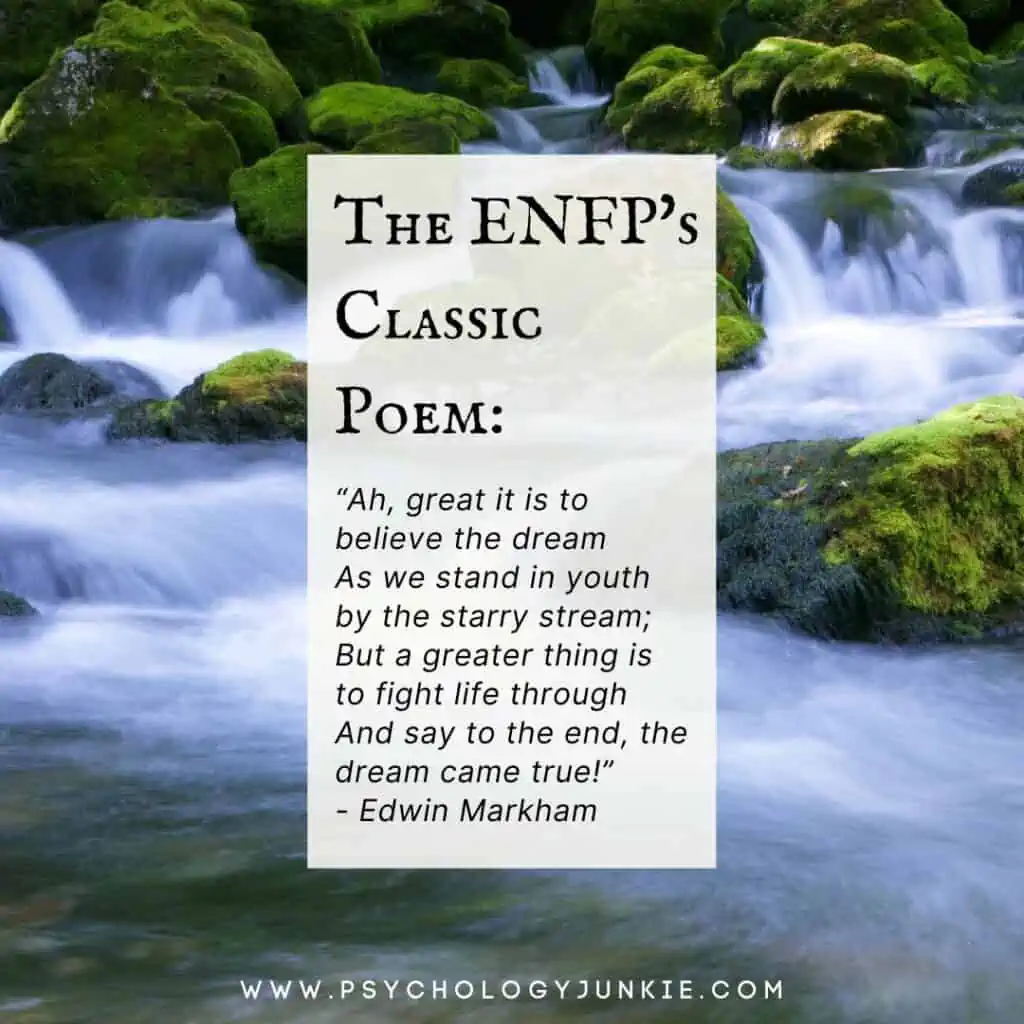
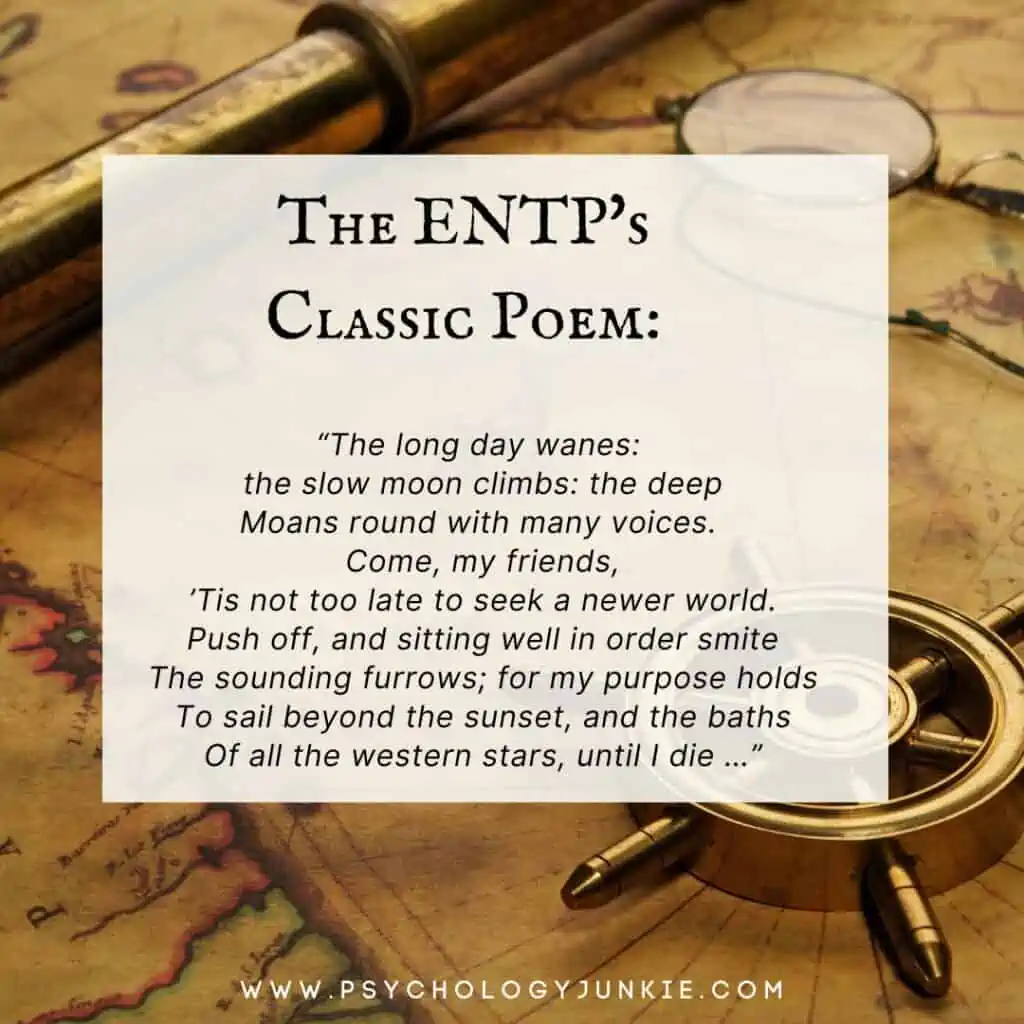
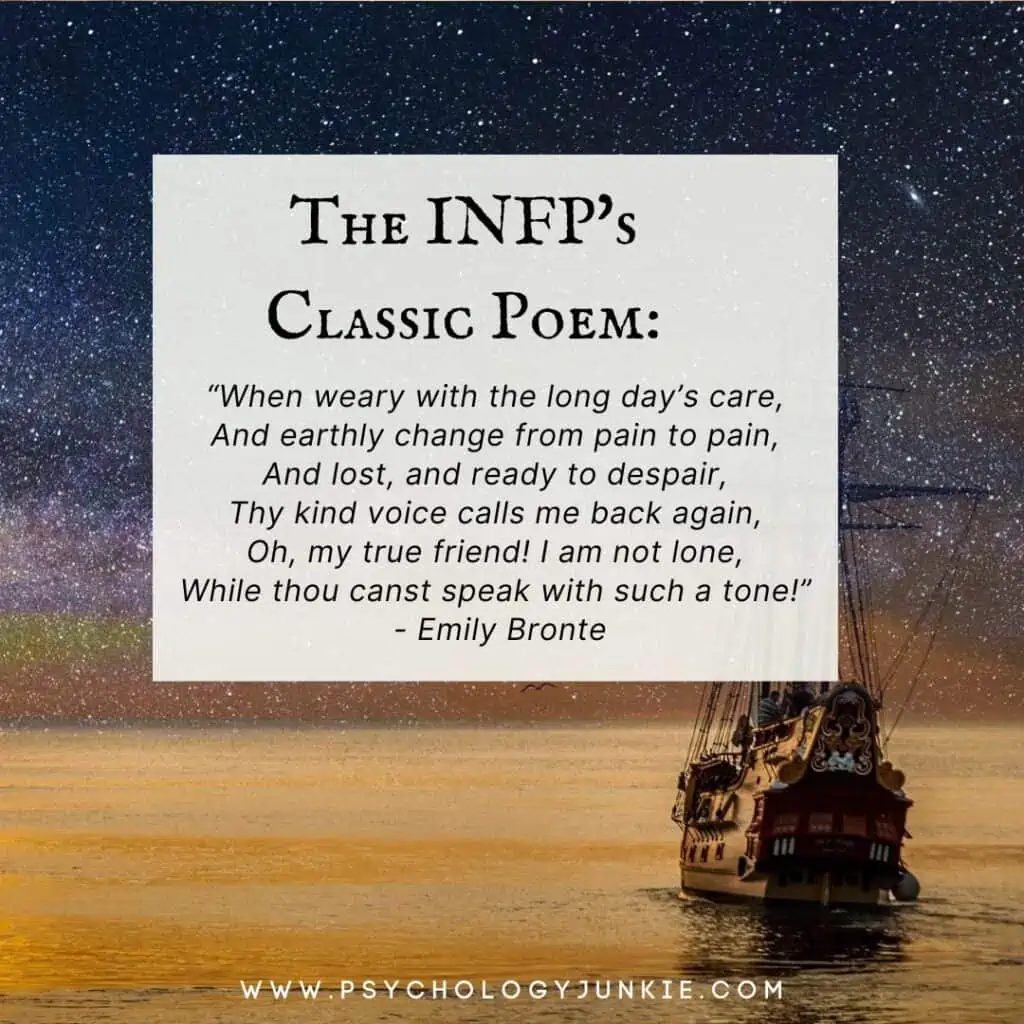
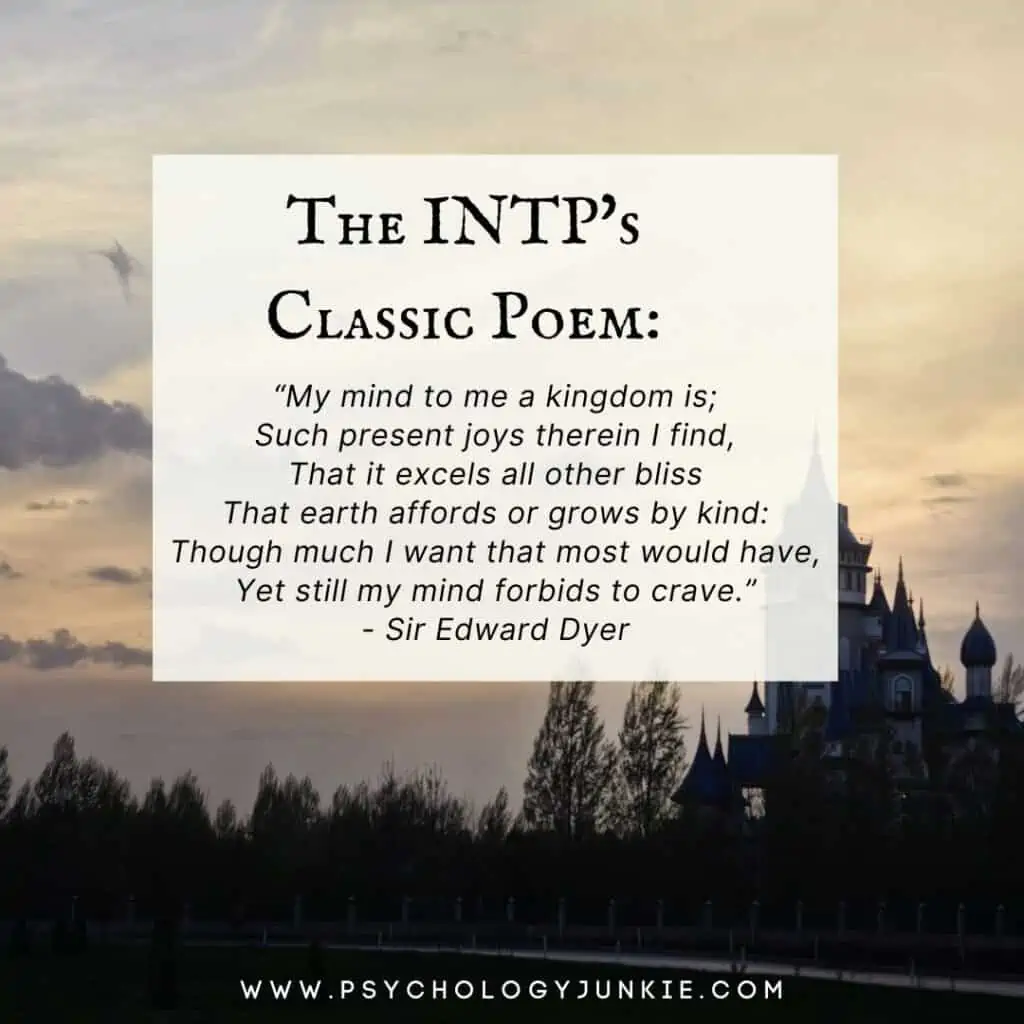
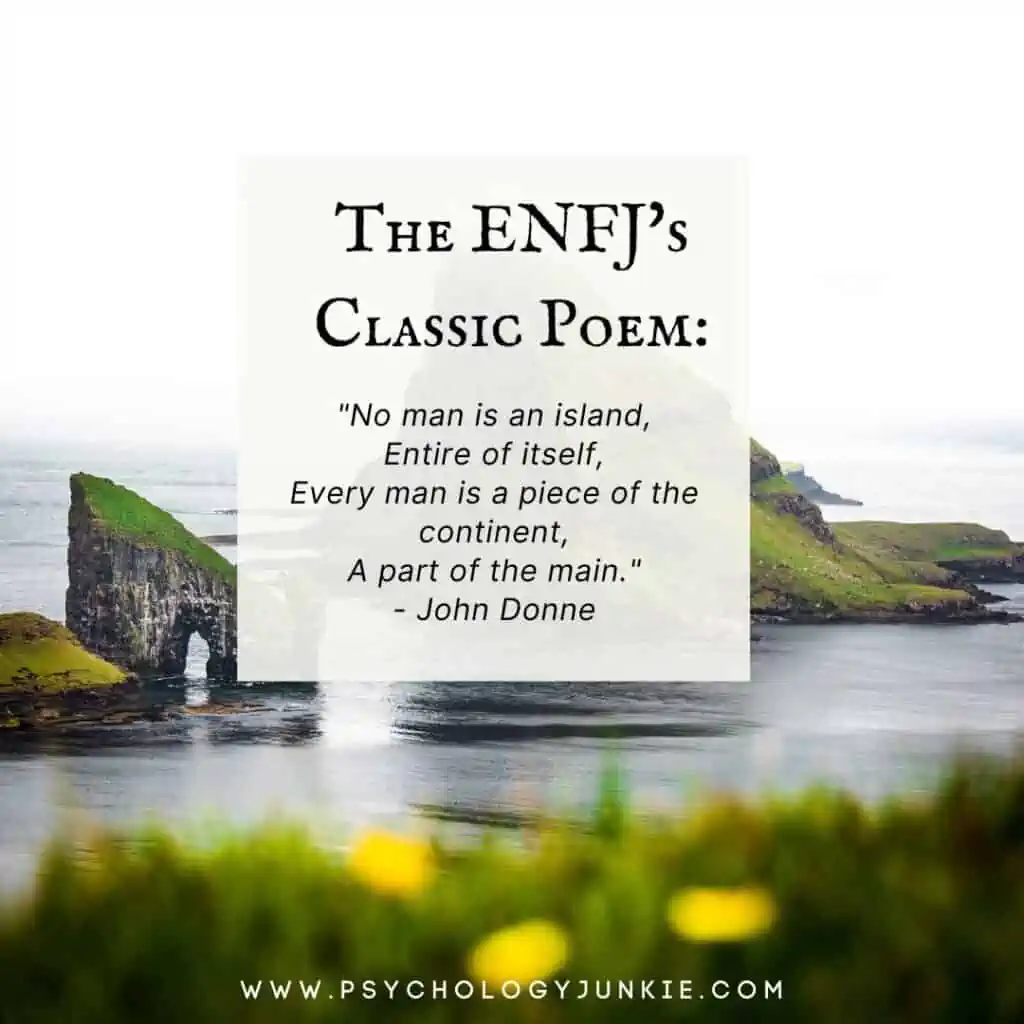
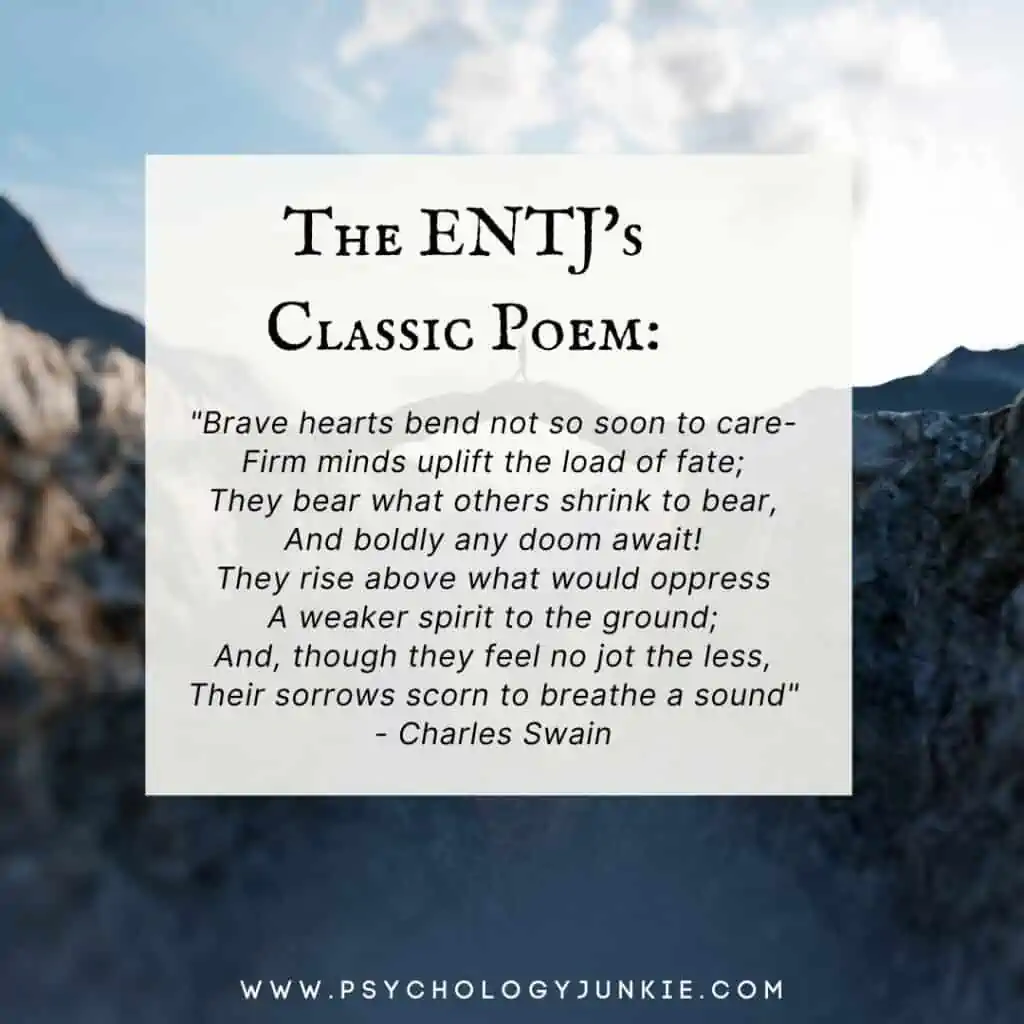
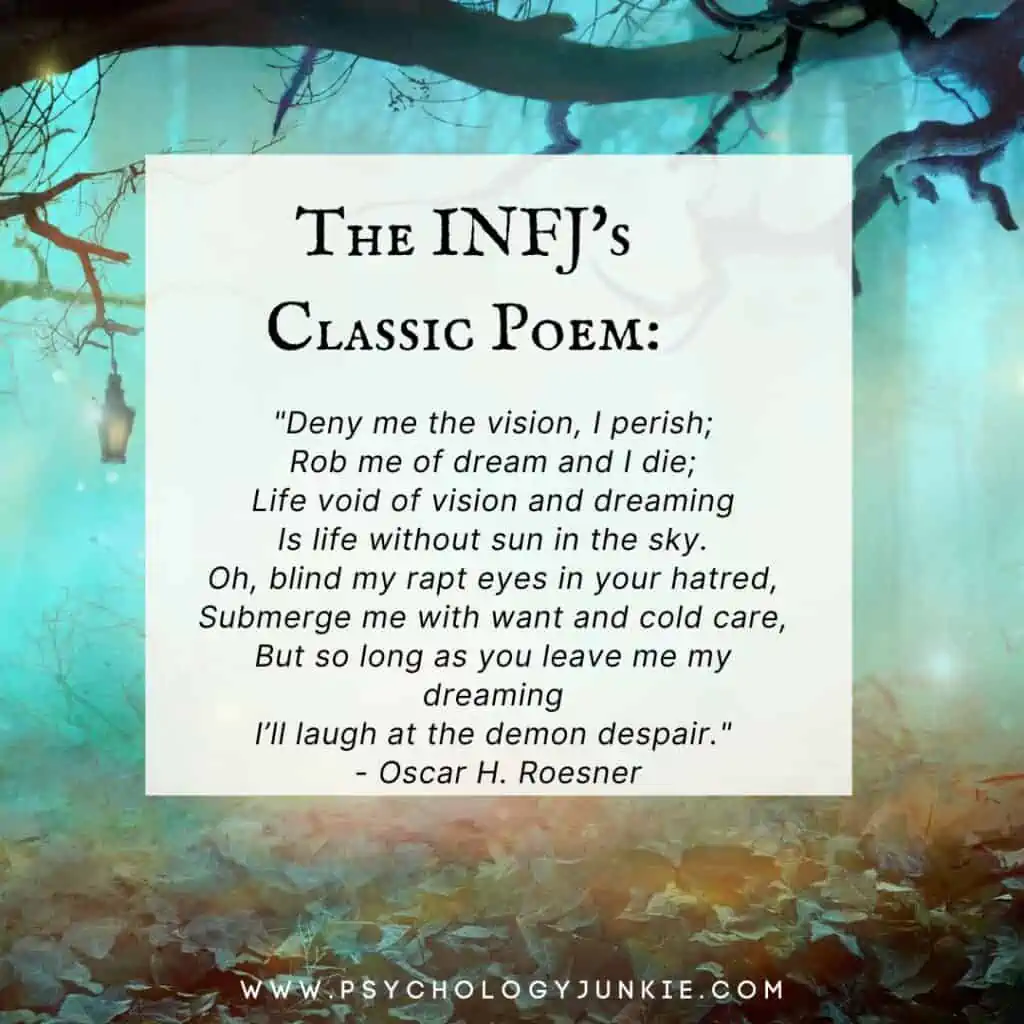
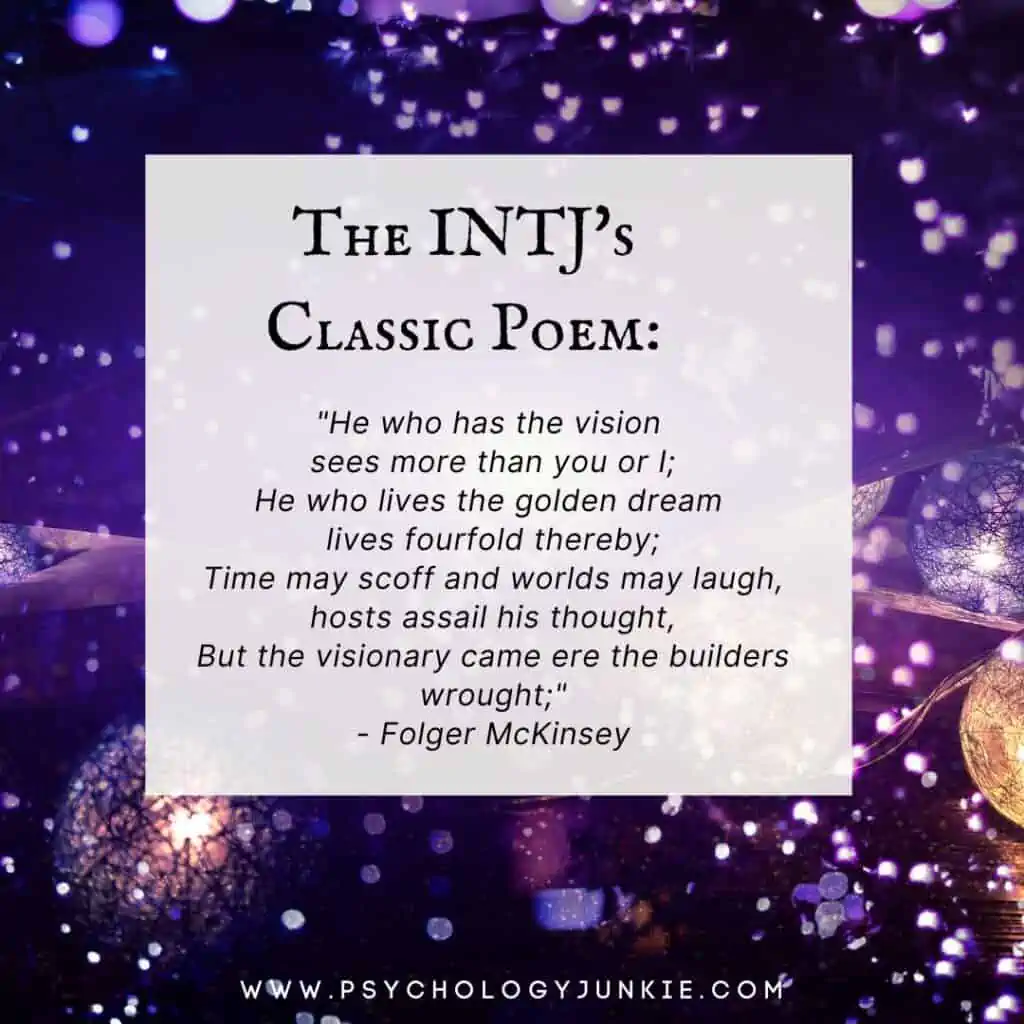
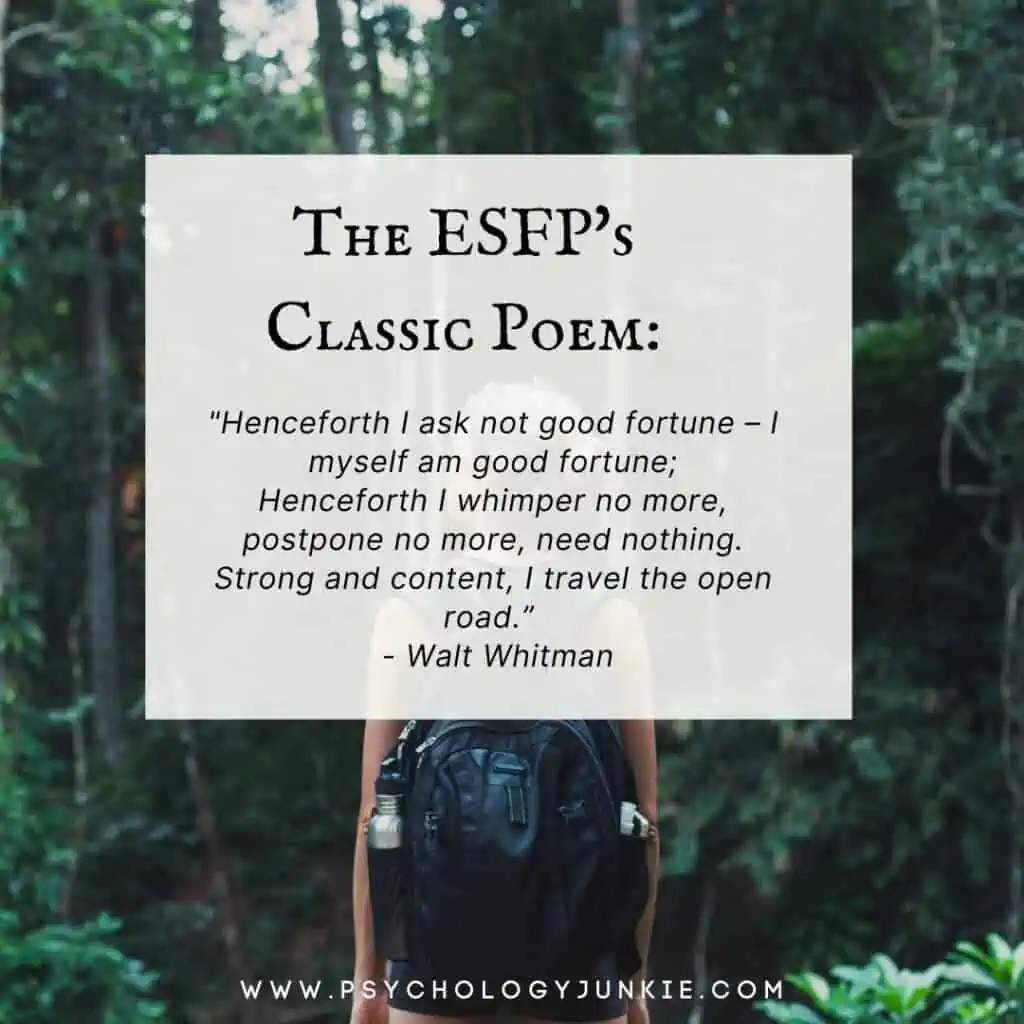
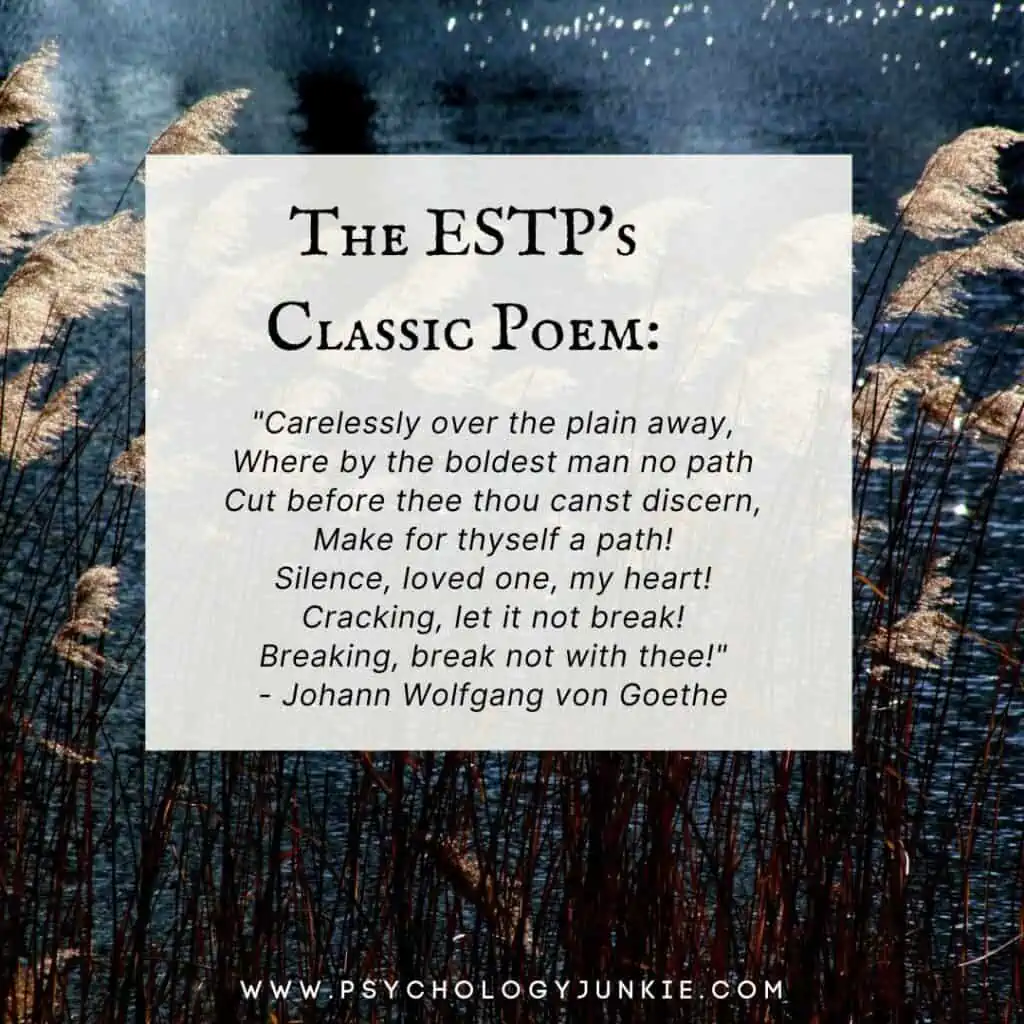
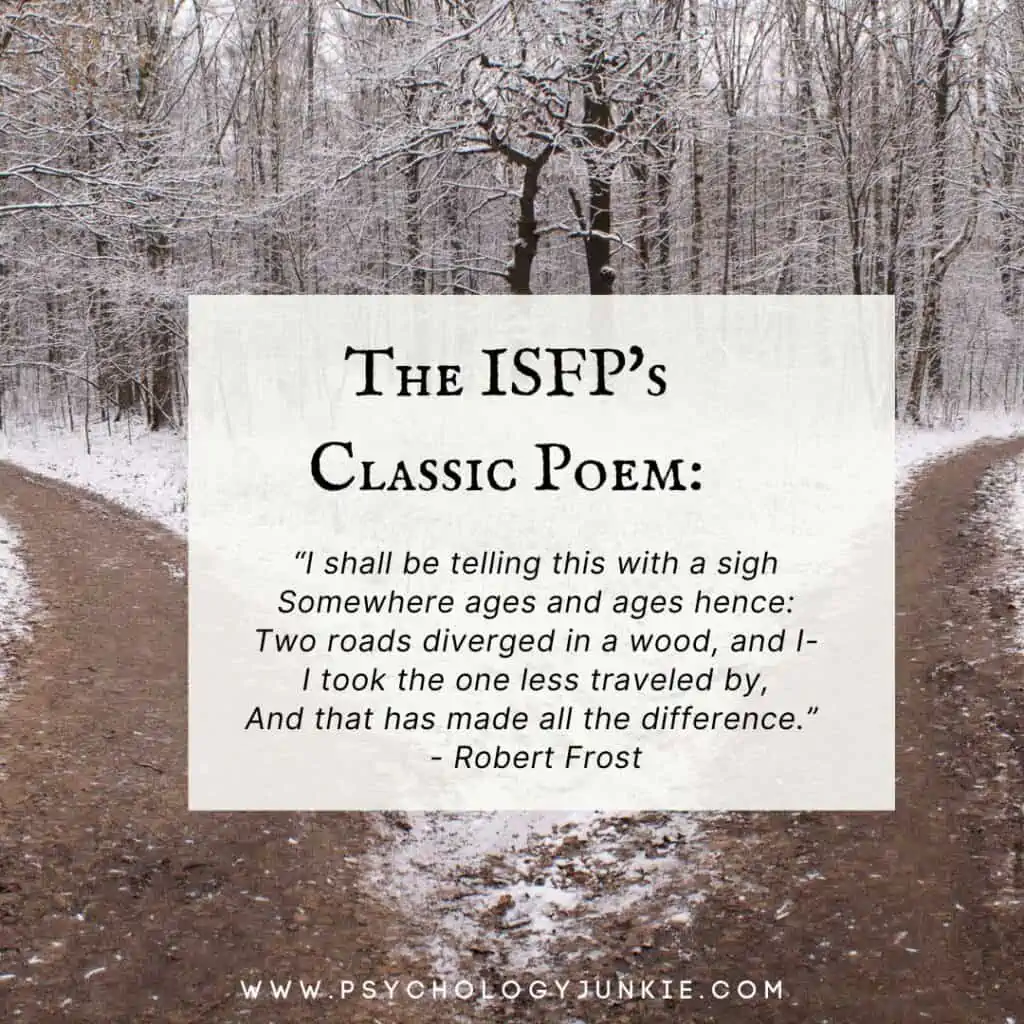
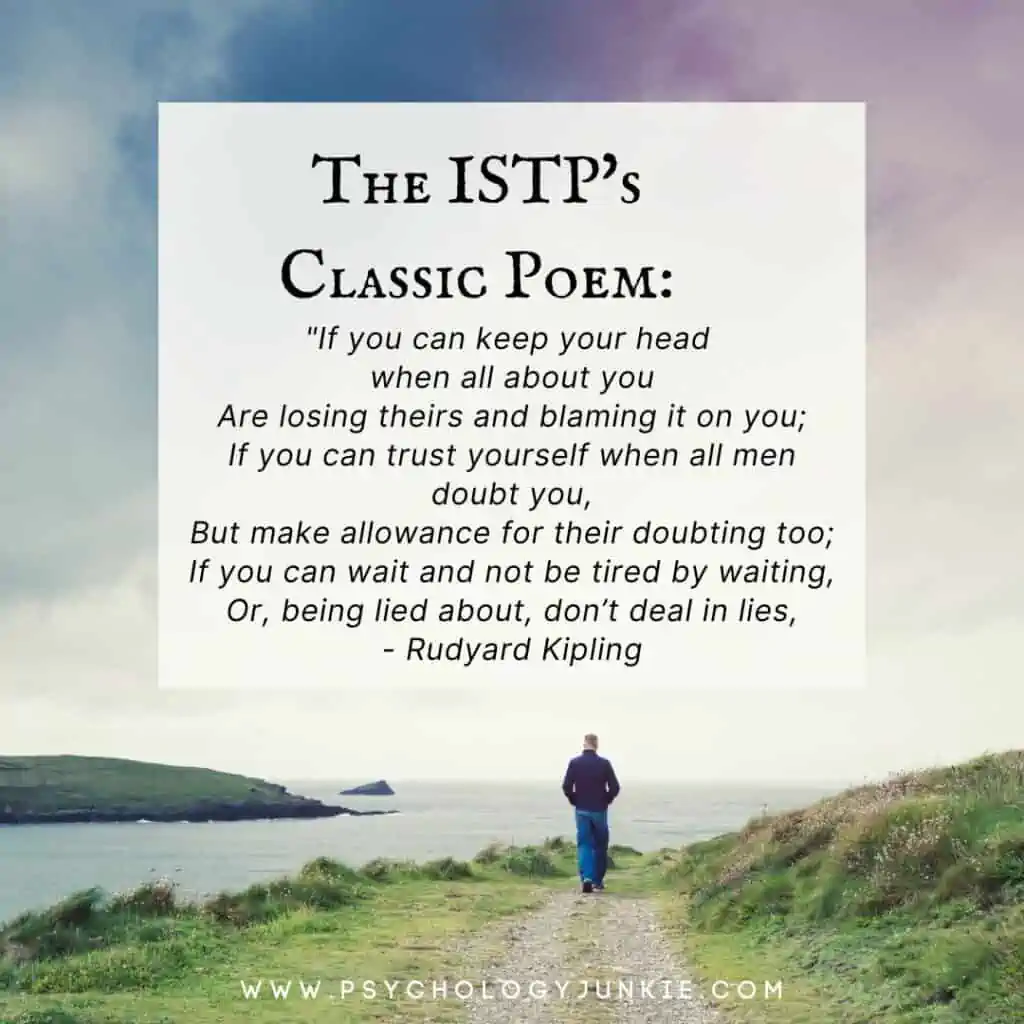
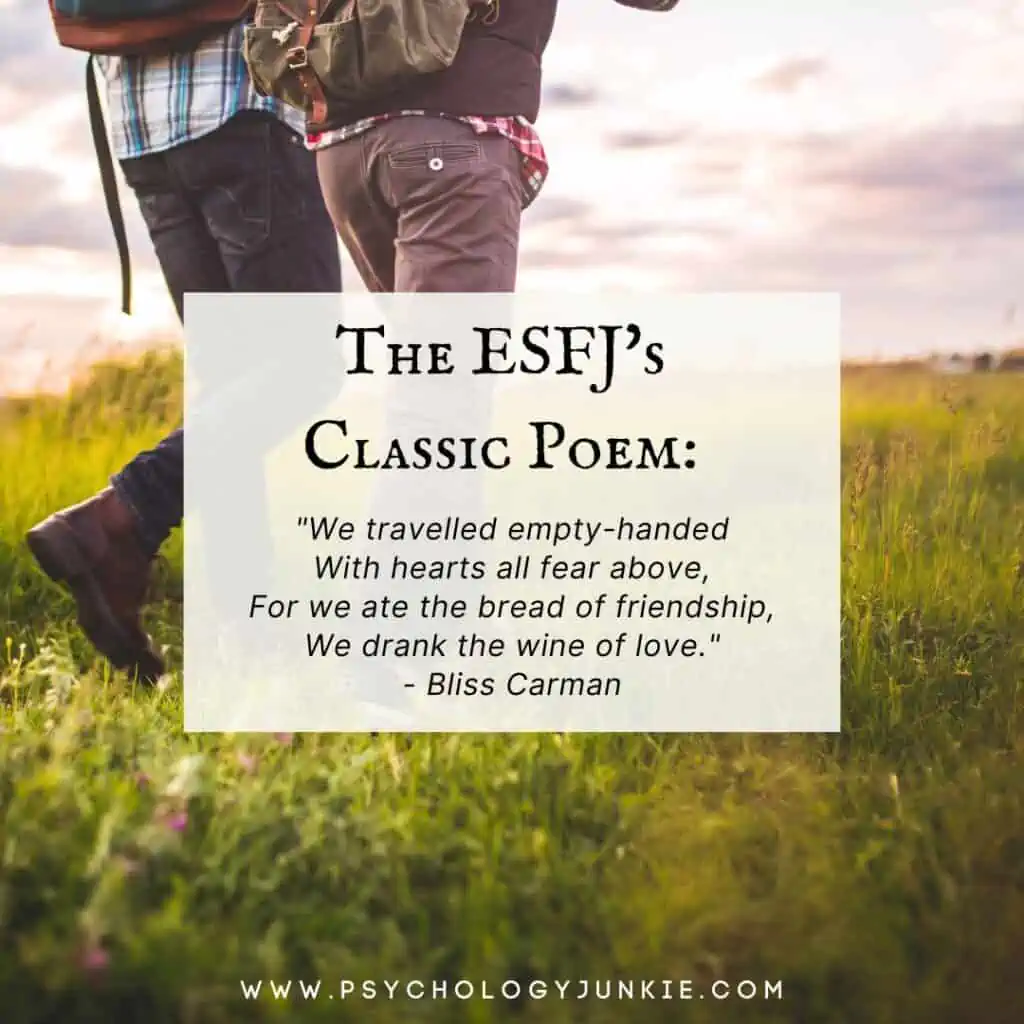
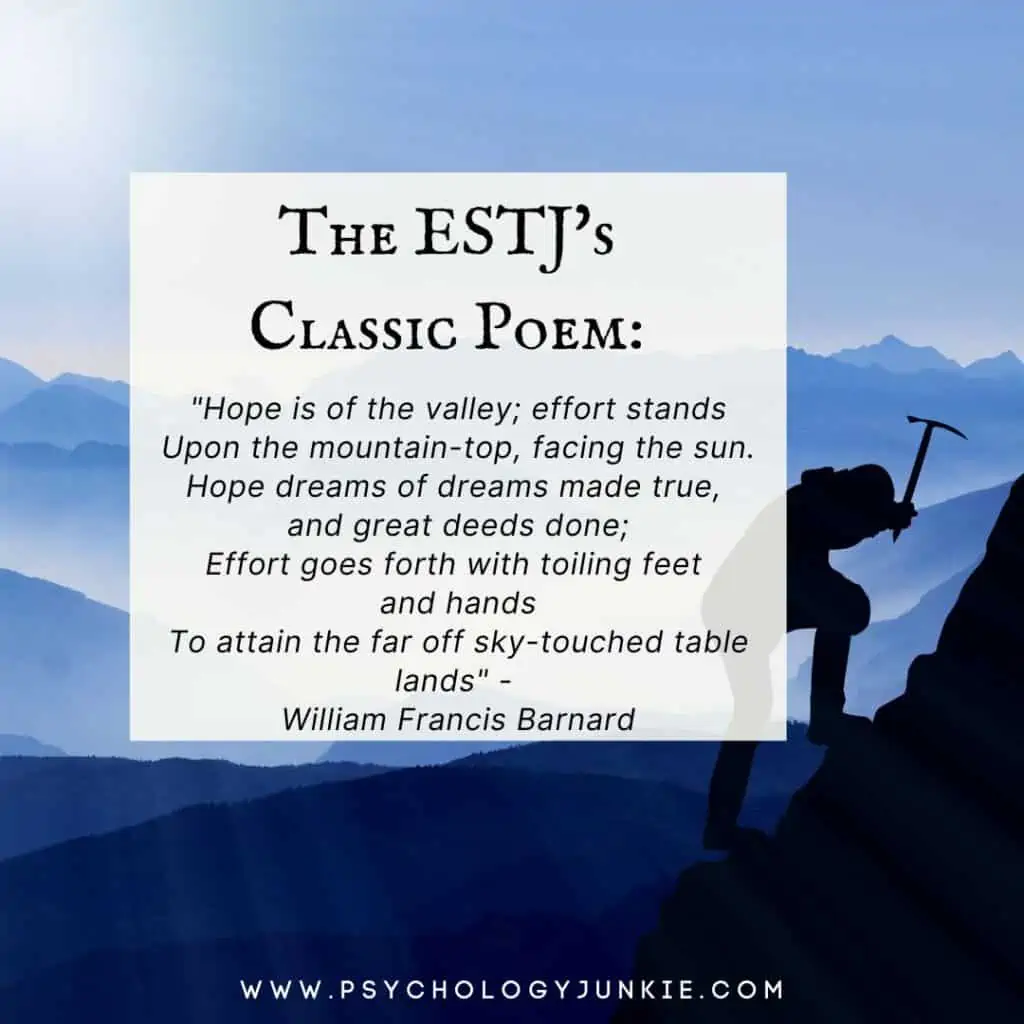
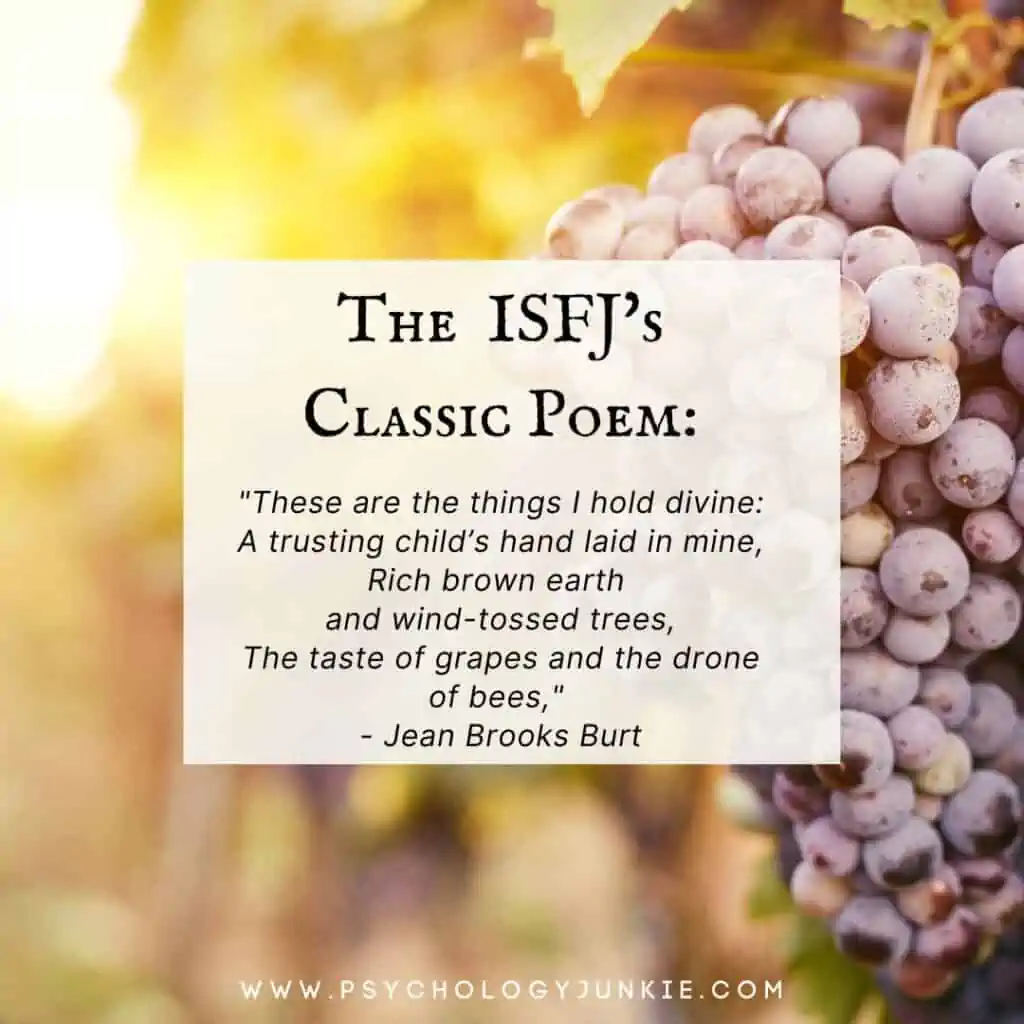
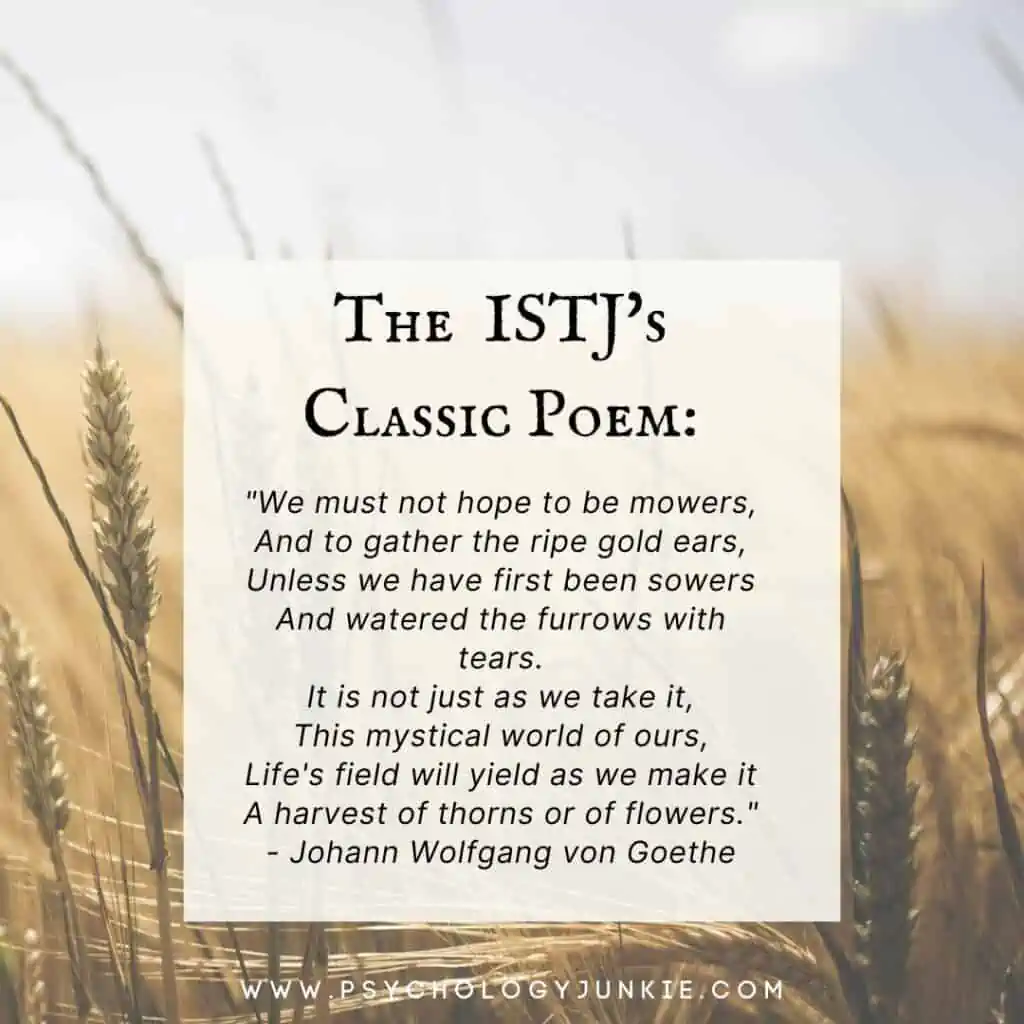












Those are some great poem choices, ma’am. Thank you.
The ESFP poem was relatable to the side of me that comes out when I am having too much fun alone or with good friends (such as reading each poem in your post in different accents). The INTJ poem is relatable to me in my normal life.
The first time I read “If” to my ISTP husband, he got somewhat emotional. He immediately printed it out and put it up in his office. He also keeps it on his phone. I was so happy to see it listed here for ISTPs.
Another (not actually a poem, but a piece) that I think other INFJs would like is Desiderata by Max Ehrmann. The whole thing speaks to me, but this part, especially:
“Beyond a wholesome discipline, be gentle with yourself. You are a child of the universe no less than the trees and the stars; you have a right to be here.”
ISTJ …..poem “Perseverance” spot on for me. Thank you.
Hi dear Susan. Do you really think ISTJs are into poetry? Hummmm🤔
I have always loved the poem “If” but I am an ESFP
Hi Susan! I’ll leave you with one of my own, a 2 am wake up special 🙂
The sun (you) and the moon (me)
Solemnly traced their trajectory through time…
Until one day the sun said to the moon,
“You dance so divinely!”
The moon glowed in reply,
“And you, my love, so sublimely.”
Hope you and yours are well ❤️
Gilbert
So meaningful. X
I’m an infj that’s never been capable of having dreams. but good poem anyway
INTPs prefer Spaghetti by Shel Silverstein.
ISTP here. If is pretty darn spot on. I also love Invictus by William Earnest Henley. Thank you for all your insights and hard work.
For ISFP, it’s “The Road Not Taken” not “The Road Less Taken”. One of the most misunderstood poems of Robert Frost, speaks of human nature of making meaning out of decisions. It’s a cycle of choice and effect, and humankind’s natural tendency of justifying outcomes. It gives life meaning, to say the decision you’ve chosen has “made all the difference”. So no, it’s not about authenticity and walking the unbeaten path.
Anyway, forgive my lazy terminologies and explanations. I love the ENFP, INFP, INFJ and ISFJ poems! A great poetry lover, my favourite themes are mortality, the human condition, nature, time, meaning and imagination!